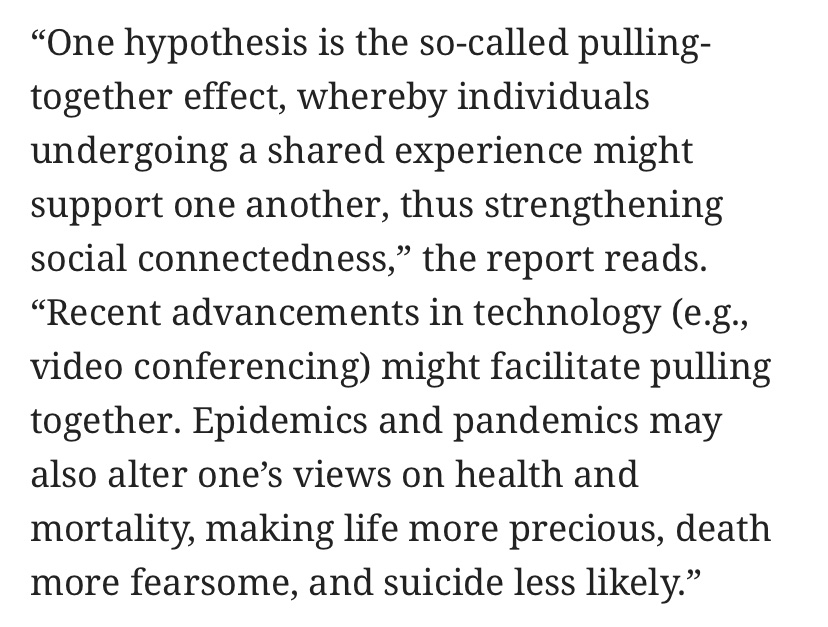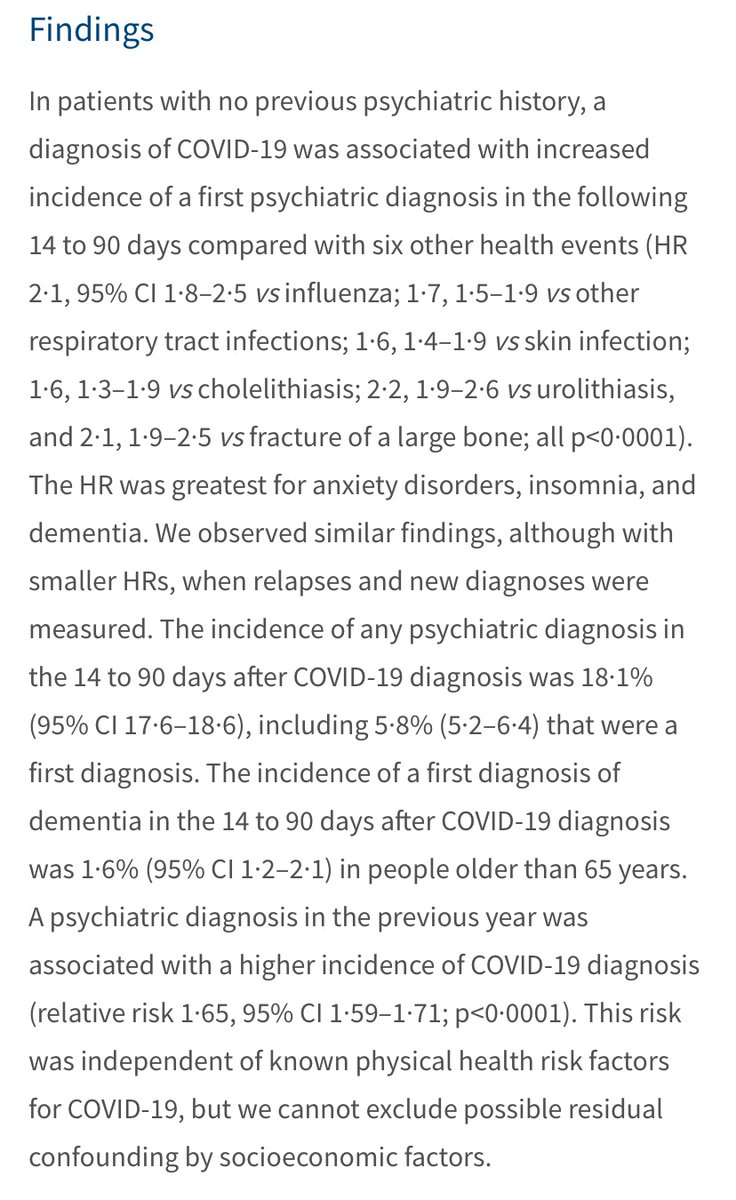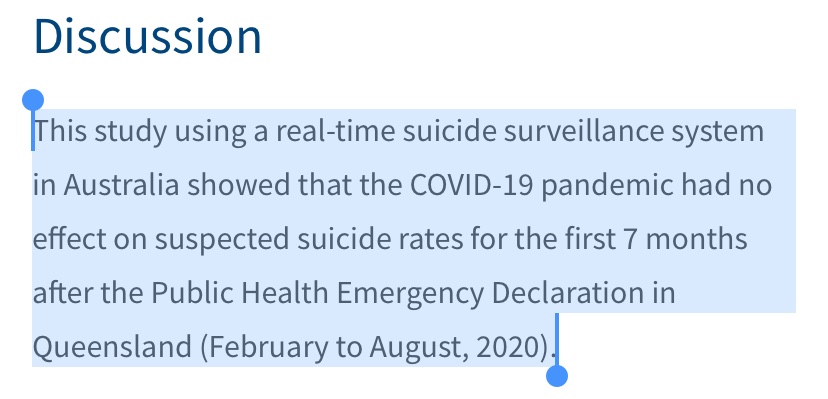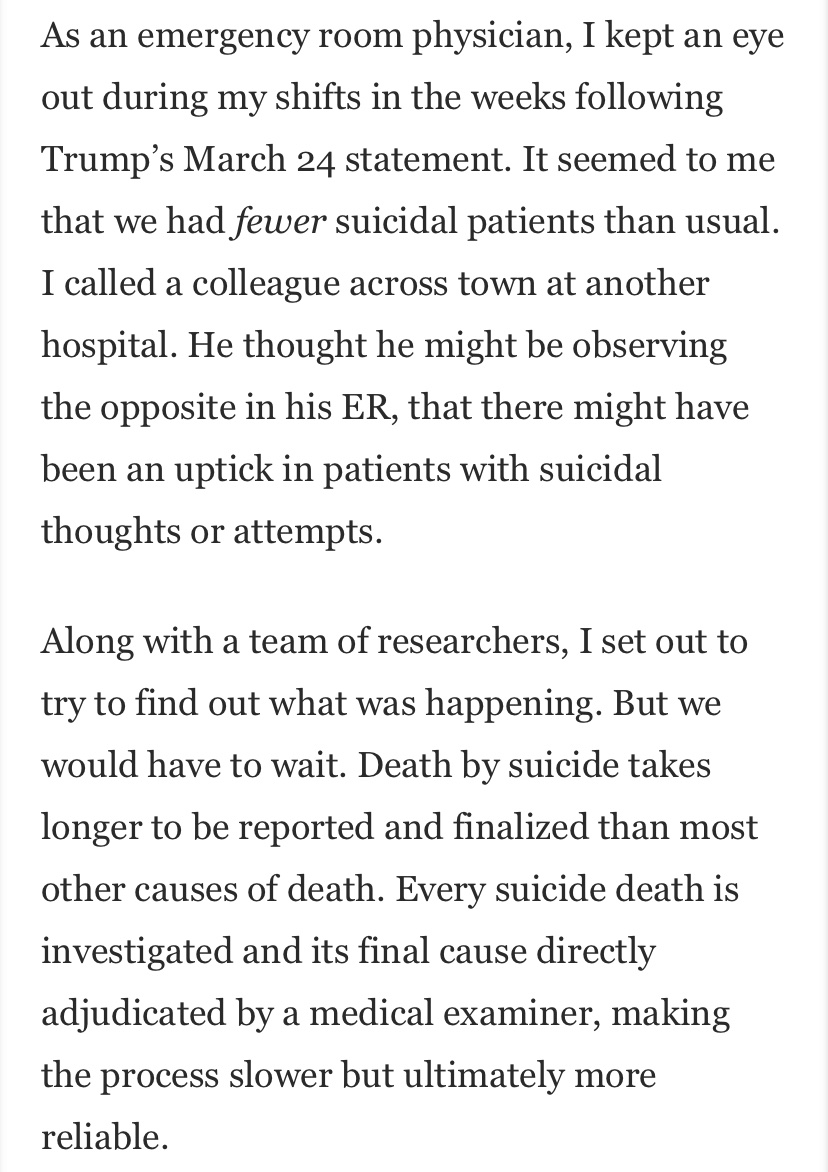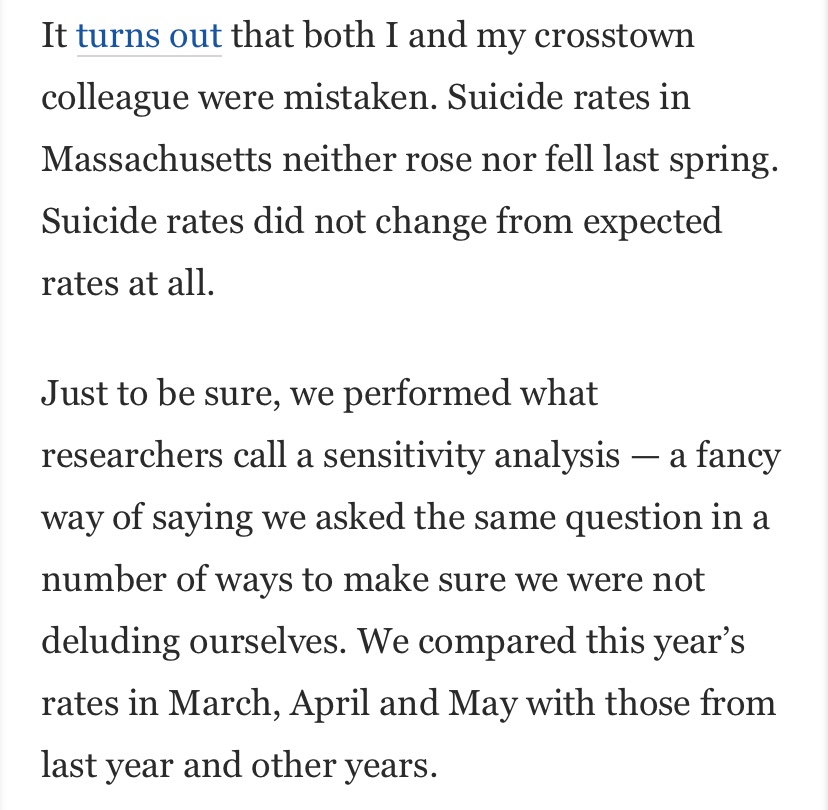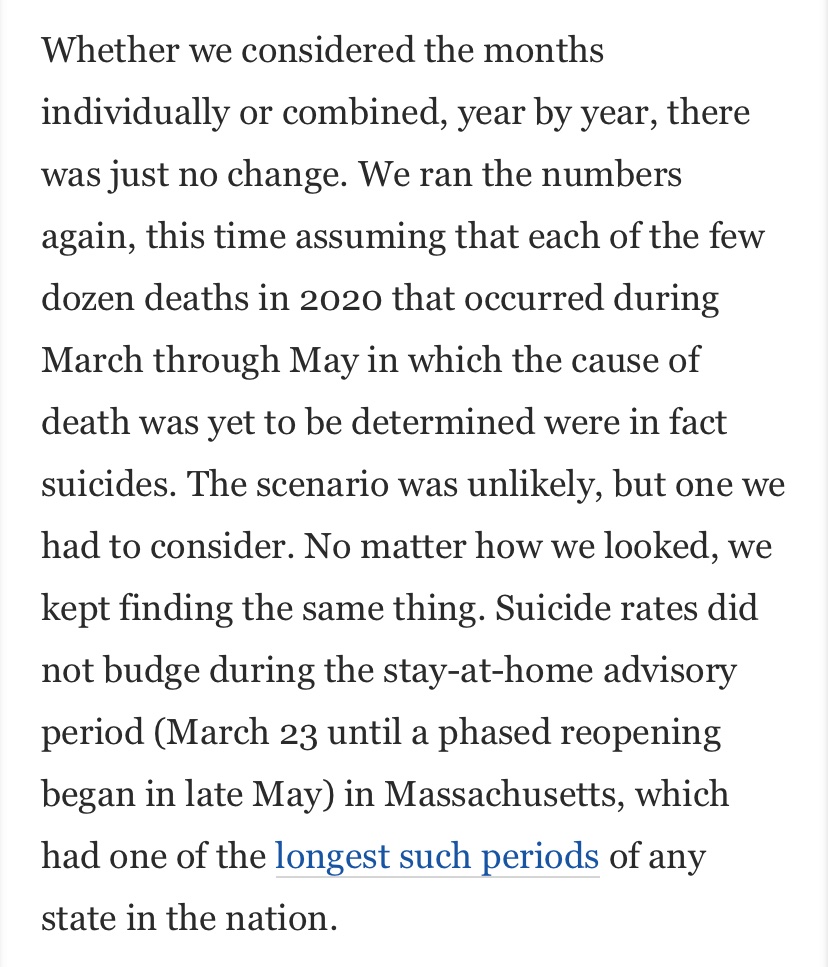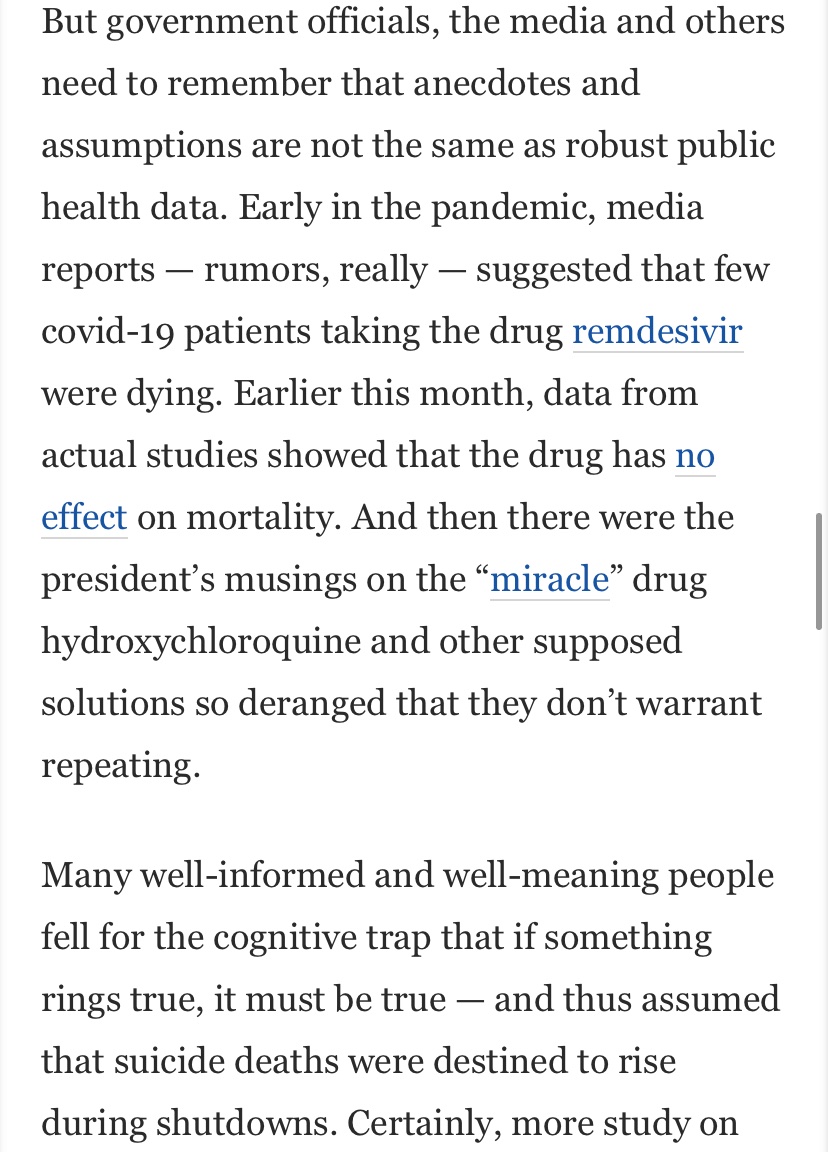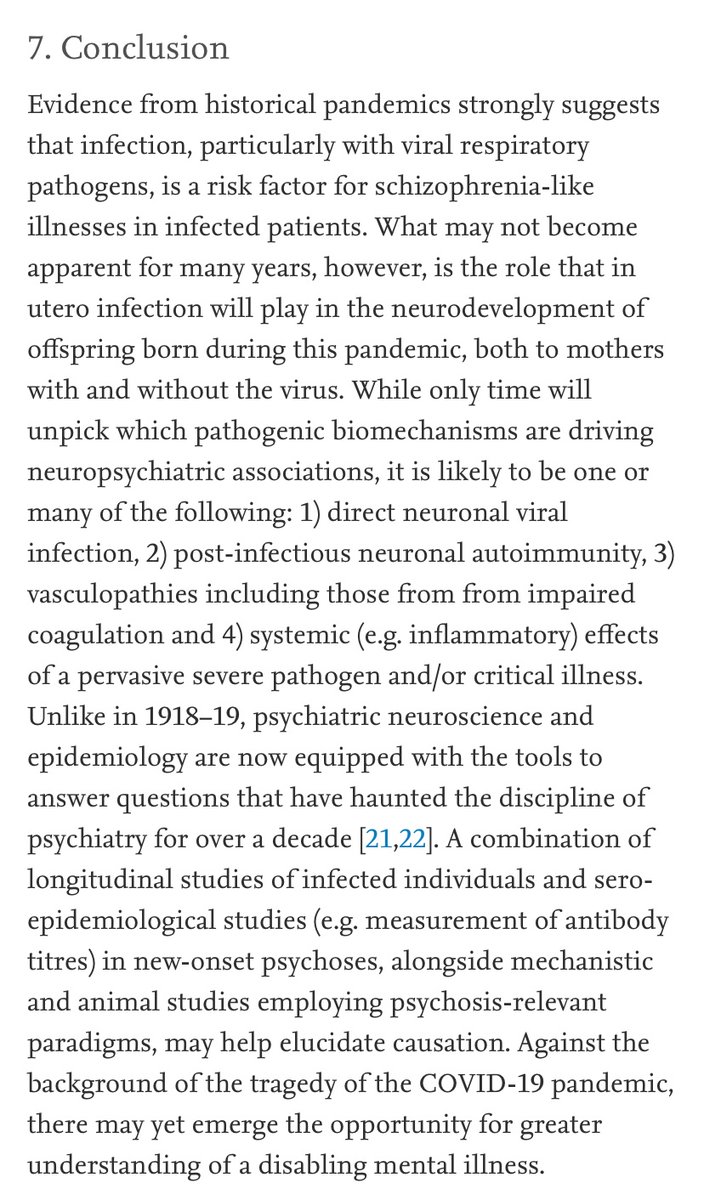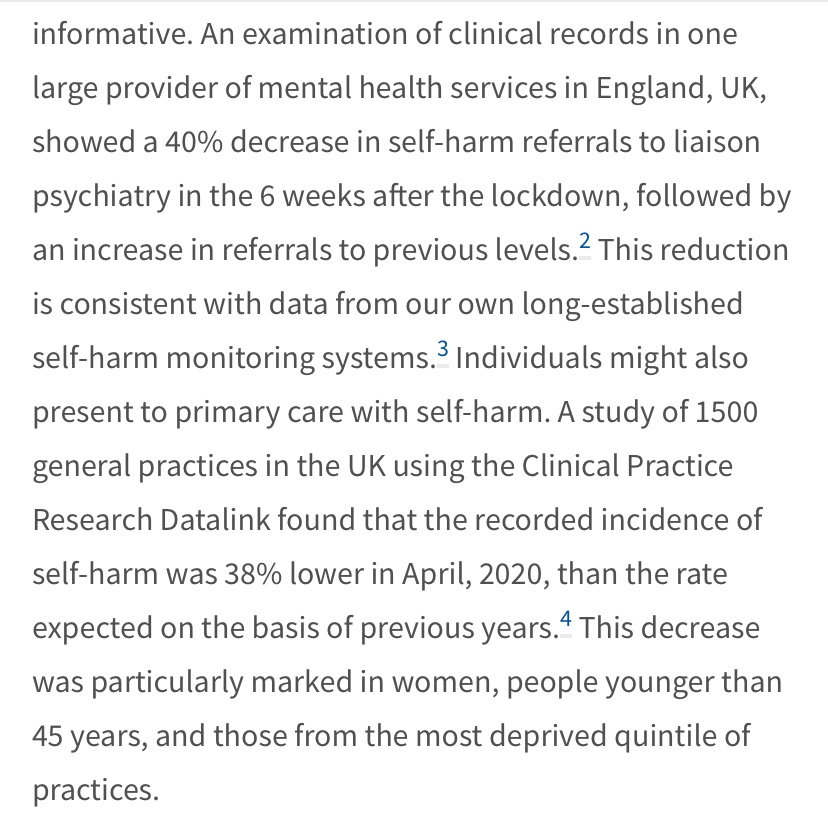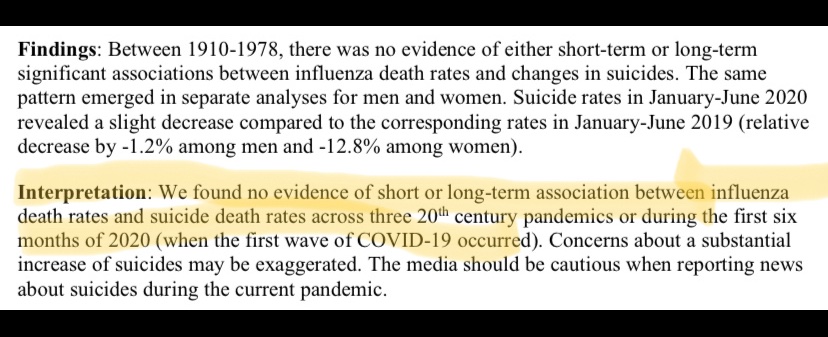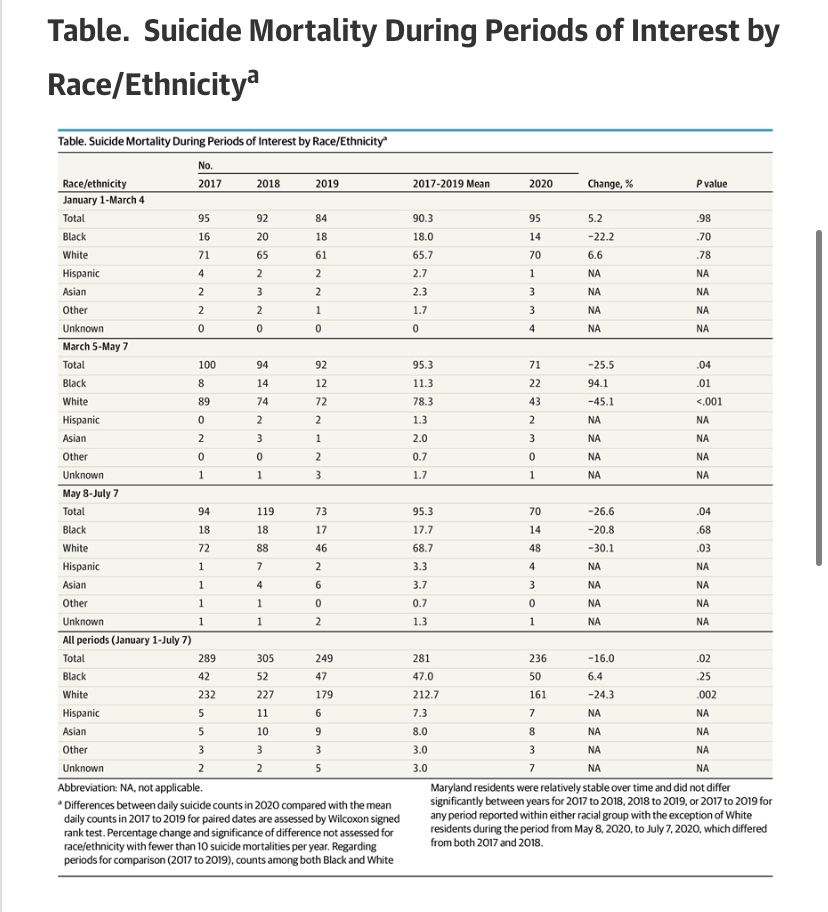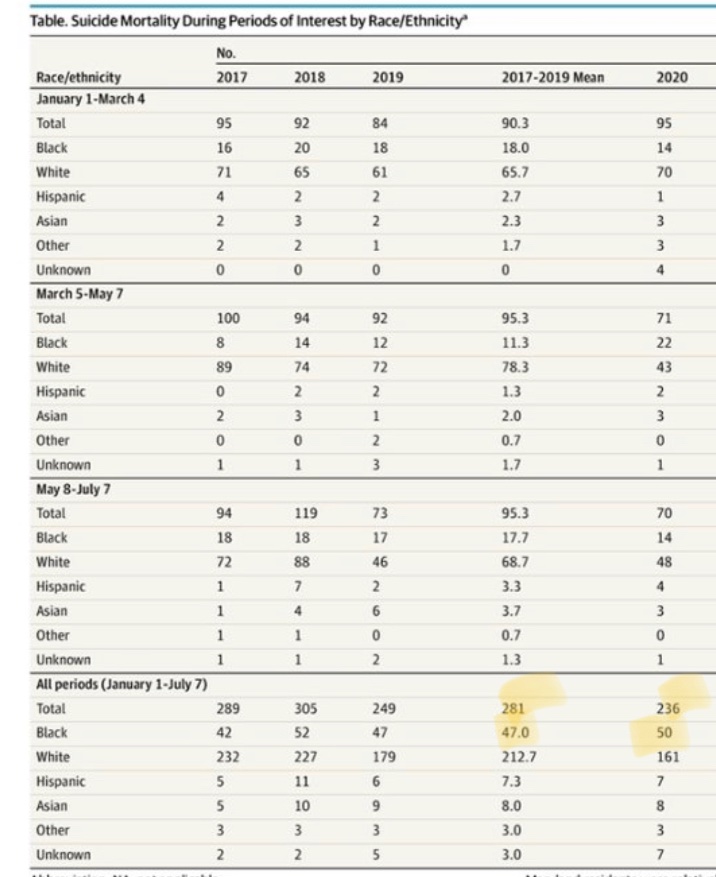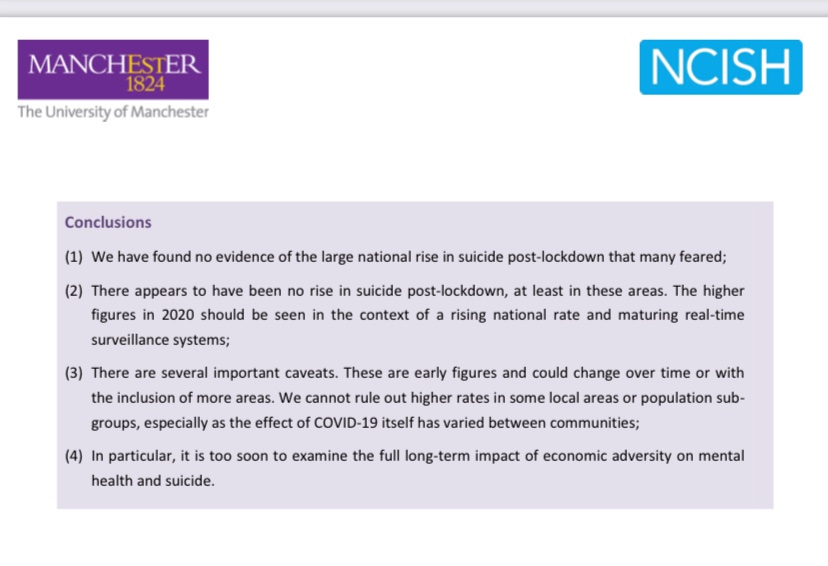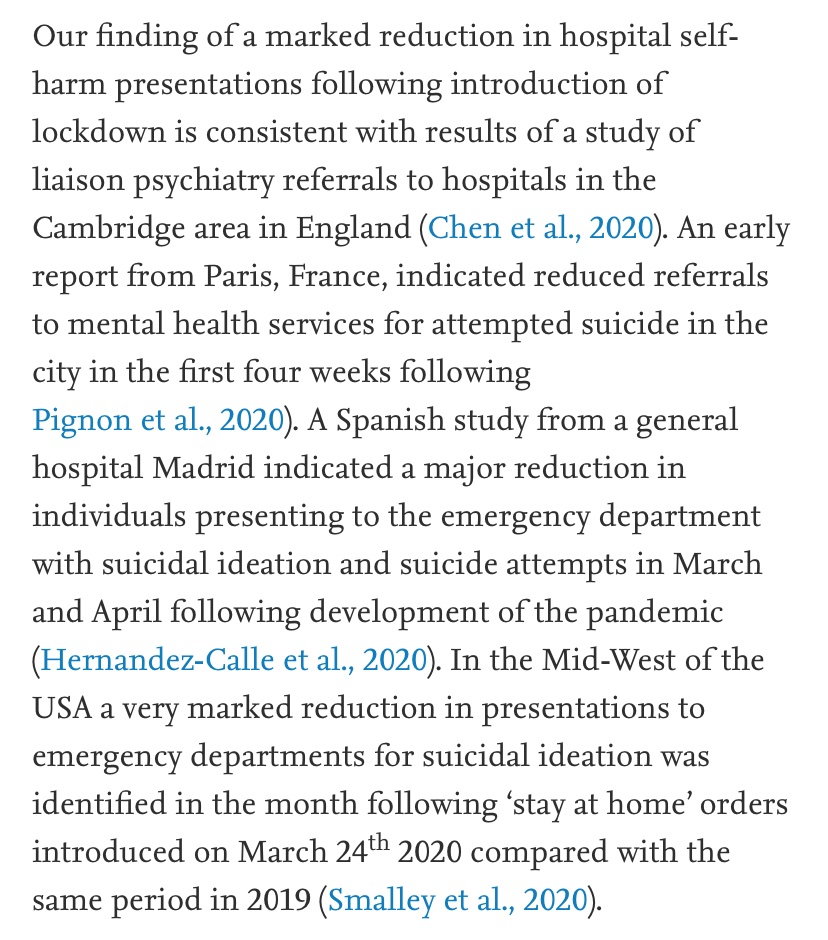People seem surprised by this but a pandemic is a bit like a war situation & during wars suicide-rates often decline never mind just stay the same. Its theorised that this phenomenon is due to the increased social cohesion that can occur during periods of great national crisis. https://twitter.com/ProfLAppleby/status/1325798197739057153
Suicide-rates declined during both world-war one & world-war two in respect to both women & men
https://www.researchgate.net/profile/David_Lester/publication/296539307_Suicide_rates_before_during_and_after_the_world_wars/links/5af98c00aca2720af9ef2f6a/Suicide-rates-before-during-and-after-the-world-wars.pdf?origin=publication_detail
https://www.researchgate.net/profile/David_Lester/publication/296539307_Suicide_rates_before_during_and_after_the_world_wars/links/5af98c00aca2720af9ef2f6a/Suicide-rates-before-during-and-after-the-world-wars.pdf?origin=publication_detail
‘There is a very predictable effect whenever there’s a crisis: it’s called the ‘come together effect.’ It’s been seen during floods and hurricanes and wartime.’ https://bc.ctvnews.ca/b-c-suicide-rate-down-during-pandemic-as-come-together-effect-observed-1.5157231
‘The findings in the current study are consistent with the notion that communities pulling together during a natural disaster can reduce interpersonal risk factors associated with the desire for suicide.’
https://psycnet.apa.org/record/2011-04683-008
https://psycnet.apa.org/record/2011-04683-008
‘Compared with Japan as a whole, the suicide rates in Kobe significantly decreased in the 2years after the earthquake. https://onlinelibrary.wiley.com/doi/full/10.1111/j.1440-1819.2009.01942.x
‘The rates of suicide are lower in the three years following the earthquake...than they are in the three years prior to the earthquake.’ https://pubmed.ncbi.nlm.nih.gov/15645626/
‘This study examined trends in daily US suicide rates around the crash sites after the 11 September 2001 terrorist attacks....... the rates for individuals whose place of residence was within 150 miles of the World Trade Center were reduced.’ https://www.cambridge.org/core/journals/the-british-journal-of-psychiatry/article/effect-of-11-september-2001-terrorist-attacks-in-the-usa-on-suicide-in-areas-surrounding-the-crash-sites/F4AF49A4F85B791060EF8AF8DA70EEEB/core-reader
‘One hypothesis is the so-called pulling-together effect, whereby individuals undergoing a shared experience might support one another, thus strengthening social connectedness.’
https://amp.sanluisobispo.com/news/local/article242738356.html?__twitter_impression=true
https://amp.sanluisobispo.com/news/local/article242738356.html?__twitter_impression=true
‘Strange how people who suffer together have stronger connections than people who are most content.’
(Bob Dylan, ‘Brownsville Girl.’)
Thats this theory in a nut-shell.
Stronger connections have been theorised to be a factor that can reduce risk for suicide since Durkheim‘s day
(Bob Dylan, ‘Brownsville Girl.’)
Thats this theory in a nut-shell.
Stronger connections have been theorised to be a factor that can reduce risk for suicide since Durkheim‘s day
Strange how people who suffer together have stronger connections than people who are most content https://twitter.com/guardiannews/status/1325745550843637761?s=20
‘Strange how people who suffer together have stronger connections than people who are most content’ https://twitter.com/ProfLAppleby/status/1327548127491059712?s=20
‘Strange how people who suffer together have stronger connections than people who are most content.’
When ppl talk about MH in respect to C-19 they’re generally referring to lockdowns. There’s not been enough focus on the MH impact of actually contracting this virus imo.
‘Survivors of COVID-19 appear to be at increased risk of psychiatric sequelae.’
https://secure.jbs.elsevierhealth.com/action/getSharedSiteSession?redirect=https%3A%2F%2Fwww.thelancet.com%2Fjournals%2Flanpsy%2Farticle%2FPIIS2215-0366%2820%2930462-4%2Ffulltext&rc=0#seccestitle10
‘Survivors of COVID-19 appear to be at increased risk of psychiatric sequelae.’
https://secure.jbs.elsevierhealth.com/action/getSharedSiteSession?redirect=https%3A%2F%2Fwww.thelancet.com%2Fjournals%2Flanpsy%2Farticle%2FPIIS2215-0366%2820%2930462-4%2Ffulltext&rc=0#seccestitle10
‘In the period between 14 and 90 days after COVID-19 diagnosis, 5·8% COVID-19 survivors had their first recorded diagnosis of psychiatric illness (F20–F48), compared with 2·5–3·4% of patients in the comparison cohorts.’
‘ Thus, adults have an approximately doubled risk of being newly diagnosed with a psychiatric disorder after COVID-19 diagnosis.’
You have the likes of Jane Kenny on Twitter & on TV banging on about lockdowns & their putative effect on ppl’s mental health. Far too little focus has been put (in the mass-media) on what the potential impact, in regards to ppl’s MH, of actually contracting C-19 are.
People think that the risks associated with C 19 are *purely* physical, well, the evidence suggests otherwise.
‘This study using a real-time suicide surveillance system in Australia showed that the COVID-19 pandemic had no effect on suspected suicide rates for the first 7 months after the Public Health Emergency Declaration in Queensland (February to August, 2020)
https://www.thelancet.com/journals/lanpsy/article/PIIS2215-0366(20)30435-1/fulltext
https://www.thelancet.com/journals/lanpsy/article/PIIS2215-0366(20)30435-1/fulltext
‘Our data are reassuring that an increase in suicide deaths in Massachusetts during the stay-at-home advisory period did not occur.’ https://www.medrxiv.org/content/10.1101/2020.10.20.20215343v1
‘Many well-informed and well-meaning people fell for the cognitive trap that if something rings true, it must be true — and thus assumed that suicide deaths were destined to rise during shutdowns.’
https://www.washingtonpost.com/opinions/2020/10/21/suicide-rates-pandemic-unchanged/
https://www.washingtonpost.com/opinions/2020/10/21/suicide-rates-pandemic-unchanged/
‘While it’s natural—and good—to worry about the mental health effects of the pandemic, the supposition without evidence that lockdown is leading to an actual increase in suicides is a political one.’ https://slate.com/technology/2020/11/whats-actually-happening-with-suicide-during-the-pandemic.amp?__twitter_impression=true
‘The age-adjusted rate of completed suicides decreased 13% in Connecticut during the period of strict stay-at-home COVID-19 quarantine.’ https://www.sciencedirect.com/science/article/pii/S016517812033290X
A thread on the same subject as this thread https://twitter.com/GidMK/status/1336493620610752512?s=20
New Dutch study assessing mental health impact of C-19 on people who already have a mental health-related diagnosis.
‘The COVID-19 pandemic does not seem to have further increased symptom severity compared with their pre-pandemic levels.’ https://www.thelancet.com/journals/lanpsy/article/PIIS2215-0366(20)30491-0/fulltext#.X9IXfwKf5oE.twitter
‘The COVID-19 pandemic does not seem to have further increased symptom severity compared with their pre-pandemic levels.’ https://www.thelancet.com/journals/lanpsy/article/PIIS2215-0366(20)30491-0/fulltext#.X9IXfwKf5oE.twitter
The mental health story of this pandemic is a lot more nuanced than you would realise from much of the Twitter discourse on this subject. This is my conclusion.
& there has been far more focus on the putative mental health impact of measures taken by governments to mitigate the spread of the infection such as lockdowns & not enough focus on what the mental impact might be of actually getting the virus itself.
On that note, here is a discussion about whether there might be a link between C-19 & psychosis. This is the conclusion, more questions than answers but important to ask those questions all the same
https://www.sciencedirect.com/science/article/pii/S0304394020307618
https://www.sciencedirect.com/science/article/pii/S0304394020307618
‘Evidence from historical pandemics strongly suggests that infection, particularly with viral respiratory pathogens, is a risk factor for schizophrenia-like illnesses in infected patients.’
Anyone who has read ‘Awakenings’ by Oliver Sacks or watched the film starring Robin Williams & Robert De Niro will have a sense of what the author is trying to convey here, albeit ‘encephalitis lethargica’ was more like Parkinsons Disease than Schizophrenia in truth.
In any case, lets hope that C-19 doesnt eventually result in neuro-psychiatric problems for patients in the longer-term. Which is all the more reason that we should be vigilant in regards to mitigating the spread of the virus.
‘There is no indication that the pandemic has caused self-harm rates to increase in the UK. This finding is consistent with international data on suicidal behaviour.’
https://www.thelancet.com/journals/lanpsy/article/PIIS2215-0366(20)30528-9/fulltext
https://www.thelancet.com/journals/lanpsy/article/PIIS2215-0366(20)30528-9/fulltext
‘Will the COVID-19 pandemic lead to a tsunami of suicides? A Swedish nationwide analysis of historical and 2020 data’
https://twitter.com/christianruck/status/1337434879559163906?s=20
https://twitter.com/christianruck/status/1337434879559163906?s=20
‘Between 1910-1978, there was no evidence of either short-term or long-term significant associations between influenza death rates and changes in suicides. The same pattern emerged in separate analyses for men and women.’
‘Suicide rates in January-June 2020 revealed a slight decrease compared to the corresponding rates in January-June 2019 (relative decrease by -1.2% among men and -12.8% among women).’
‘We found no evidence of short or long-term association between influenza death rates and suicide death rates across three 20th century pandemics or during the first six months of 2020 (when the first wave of COVID-19 occurred).’
‘Concerns about a substantial increase of suicides may be exaggerated. The media should be cautious when reporting news about suicides during the current pandemic.’
‘Colorado recorded a 40% decrease in suicides in March and April as social-distancing policies aimed at slowing the spread of the novel coronavirus kept residents home, according to provisional death-certificate data from the state health department.’ https://www.denverpost.com/2020/05/23/colorado-suicides-dropped-coronavirus-pandemic-calls-to-crisis-line-spiked/amp/?__twitter_impression=true
.................... https://twitter.com/tylerblack32/status/1337516030302687232?s=20
Suicide stats, thus far, for Maryland, USA, in the current year, 2020. Mortality in relation to suicide is down this year in the state from previous years but down, in particular, amongst white Marylanders not really amongst black Marylanders.
https://jamanetwork.com/journals/jamapsychiatry/fullarticle/2774107?utm_source=twitter&utm_campaign=content-shareicons&utm_content=article_engagement&utm_medium=social&utm_term=121620#.X9p2gnafsk0.twitter
https://jamanetwork.com/journals/jamapsychiatry/fullarticle/2774107?utm_source=twitter&utm_campaign=content-shareicons&utm_content=article_engagement&utm_medium=social&utm_term=121620#.X9p2gnafsk0.twitter
The suicide-rate is down quite a bit amongst whites in Maryland, but *slightly* up amongst black ppl in Maryland. So, a mixed picture there really.
‘During the early months of the Covid-19 pandemic in France - including the first confinement -, a general decrease in the number of hospitalizations for self-harm was observed. However, an increase was found among the elderly.’ https://www.medrxiv.org/content/10.1101/2020.12.18.20248480v1.full
The suicide-rate declined in Japan Feb-June 2020 but then rose July-Oct 2020 especially among women & young people
https://www.nature.com/articles/s41562-020-01042-z.pdf
https://www.nature.com/articles/s41562-020-01042-z.pdf
Latest suicide figures for England compiled by @NCISH_UK
They conclude:- ‘We have found no evidence of the large national rise in suicide post-lockdown that many feared.’
http://documents.manchester.ac.uk/display.aspx?DocID=51861
They conclude:- ‘We have found no evidence of the large national rise in suicide post-lockdown that many feared.’
http://documents.manchester.ac.uk/display.aspx?DocID=51861
Forgot to include this piece of research in this thread. Its findings are possibly another example of the ‘come together effect’ that Ive discussed in this thread. To reiterate: the ‘come together effect,’ it is theorised, is protective against suicide. https://twitter.com/DegenRolf/status/1350092995455037446?s=20
Sounds like an interesting book https://twitter.com/allycinnamon76/status/1351860493825282049?s=20
‘Self-harm during the early period of the COVID-19 pandemic in England........... .... a substantial decline in hospital presentations for self-harm occurred during the three months following the introduction of lockdown restrictions’
https://www.sciencedirect.com/science/article/pii/S0165032721000288
https://www.sciencedirect.com/science/article/pii/S0165032721000288
Newly published piece of research about stay-at-home orders in Massachusetts, USA, in March-May 2020, does not find an significant association with an increased risk of suicide. https://jamanetwork.com/journals/jamanetworkopen/fullarticle/2775359?utm_source=twitter&utm_campaign=content-shareicons&utm_content=article_engagement&utm_medium=social&utm_term=012121#.YAmnLBuH4KQ.twitter
‘Following the onset of the COVID-19 pandemic, in April, 2020, the incidence of primary care-coded depression, anxiety disorders, antidepressant prescribing, and self-harm decreased sharply compared with expected rates in all four UK nations.’ https://www.thelancet.com/journals/lanpub/article/PIIS2468-2667(20)30288-7/fulltext?rss=yes&utm_campaign=update-lanpub&utm_medium=email&_hsmi=107376625&_hsenc=p2ANqtz--N2mcXWS61qrzhUcHCCRiR6X9yCngZxeEr_wfYeWRlXRVOmobBbRq4vOxU8C4uMTj2M0UvxTUE5bsRqq9P_85xP7iR7g&utm_content=107376625&utm_source=hs_email
................ https://twitter.com/mashproject/status/1338793106976739328?s=20
‘There is no indication that the pandemic has caused self-harm rates to increase in the UK. This finding is consistent with international data on suicidal behaviour, but important caveats apply.’ https://www.sciencedirect.com/science/article/pii/S2215036620305289?dgcid=raven_sd_via_email

 Read on Twitter
Read on Twitter